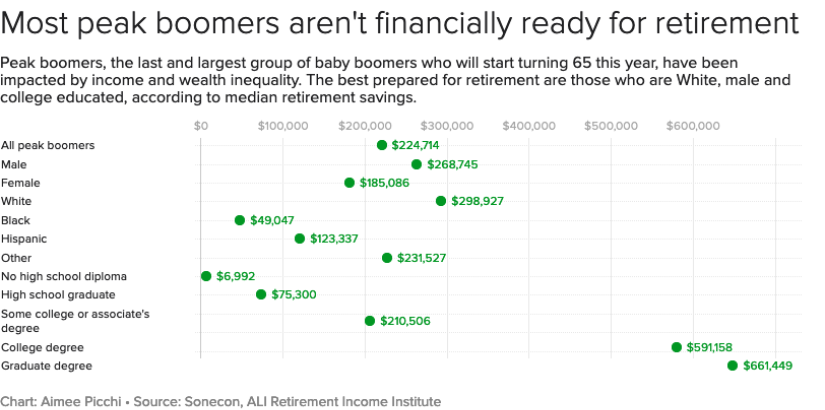The nation is rapidly approaching “peak 65” as younger baby boomers turn 65 this year, initiating the biggest wave of retirements in U.S. history. Yet most of those Americans are financially unprepared to stop working, and many risk living in poverty, according to a new analysis.
The retirements of the youngest boomers — those born between 1959 and 1965 — are likely to reshape the U.S. economy, and not in entirely positive ways, according to the study from the ALI Retirement Income Institute, a non-profit focused on retirement education.
The new research underscores the impact that income and wealth inequality has had on a generation that, at least on aggregate, is the nation’s wealthiest. Boomers who are White, male or have college degrees are the most likely to be financially prepared for retirement, but many people of color, women and those with only high school educations are lagging, the study found.
“A majority will find themselves with inadequate resources for retirement, and a large majority will either have inadequate resources or are likely to suffer significant strains in retirement,” Robert J. Shapiro, a co-author of the study and the chairman of economic consulting firm Sonecon, told CBS MoneyWatch. “This isn’t part of the American dream.”
The findings echo other research that has found more than 1 in 4 older workers are nearing retirement without a penny in savings. While many younger people have yet to start putting money for their later years, it’s more concerning for younger boomers approaching retirement age given they have only a few years left to sock money away.

The nation is rapidly approaching “peak 65” as younger baby boomers turn 65 this year, initiating the biggest wave of retirements in U.S. history. Yet most of those Americans are financially unprepared to stop working, and many risk living in poverty, according to a new analysis.
The retirements of the youngest boomers — those born between 1959 and 1965 — are likely to reshape the U.S. economy, and not in entirely positive ways, according to the study from the ALI Retirement Income Institute, a non-profit focused on retirement education.
The new research underscores the impact that income and wealth inequality has had on a generation that, at least on aggregate, is the nation’s wealthiest. Boomers who are White, male or have college degrees are the most likely to be financially prepared for retirement, but many people of color, women and those with only high school educations are lagging, the study found.
“A majority will find themselves with inadequate resources for retirement, and a large majority will either have inadequate resources or are likely to suffer significant strains in retirement,” Robert J. Shapiro, a co-author of the study and the chairman of economic consulting firm Sonecon, told CBS MoneyWatch. “This isn’t part of the American dream.”
The findings echo other research that has found more than 1 in 4 older workers are nearing retirement without a penny in savings. While many younger people have yet to start putting money for their later years, it’s more concerning for younger boomers approaching retirement age given they have only a few years left to sock money away.
About 53% of “peak boomers,” or the tail end of the generation who will turn 65 between 2024 and 2030, have less than $250,000 in assets, the new study found. But huge disparities exist between within the group, the study found, based on its analysis of data from the Federal Reserve and the University of Michigan Health and Retirement Study.
For instance, peak boomer men have a median retirement balance of $268,745, while women of the same age have savings of only $185,086. Peak boomers with only a high school degree have saved a median of $75,300 for retirement, compared with $591,158 for college graduates.
Many of those peak boomers will be unable to maintain their standard of living in retirement, and also are likely to be reliant on Social Security as their primary source of income, the report noted. For instance, one-third of these younger boomers will rely on Social Security benefits for at least 90% of their retirement income when they are 70, the analysis found.
Social Security is designed to replace only 40% of a person’s working income, while the average benefit is about $23,000 per year — far from enough to provide a comfortable retirement. Additional problems could arise if the Social Security system isn’t shored up before its trust funds are slated to be depleted in 2033, which could lead to across-the-board benefit cuts.
The wave of retirements by younger boomers is likely to reshape the economy, the report noted. Productivity could slow as they exit the workforce, while consumer spending could also take a hit as they pare spending.
However, there could be an upside, at least for younger workers, the report notes. With the last of the baby boom generation retiring, Gen X, millennial and even younger workers will be able to fill their vacated jobs.


